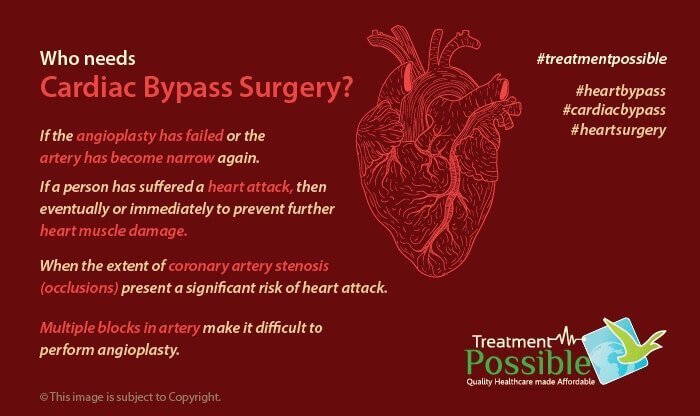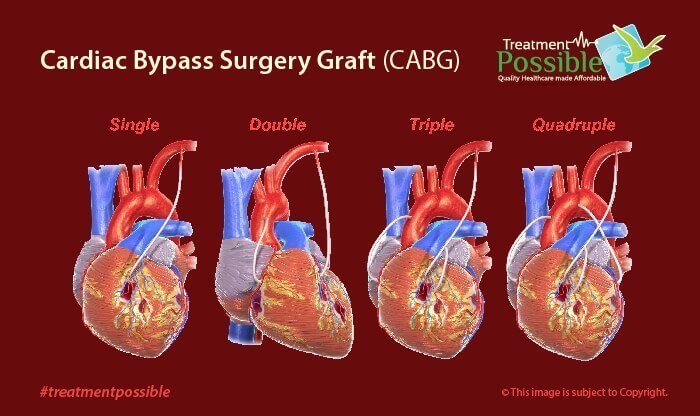Heart Bypass Surgery
What is Heart Bypass Surgery?
Heart bypass surgery is also known as ‘Coronary artery bypass graft (CABG) surgery or ‘Coronary bypass surgery.
Heart bypass surgery is performed when coronary arteries are damaged or blocked. The coronary arteries are blood vessels that supply your heart muscle with blood. Bypass surgery involves the creation of a new route so that blood can flow around the narrowed or blocked coronary arteries. The newly created route is made up of a graft. A graft is a healthy blood vessel taken from other parts of your body. Heart bypass surgery reroutes the blood flow and saves the heart from immediate damage. Your doctor will recommend Heart bypass surgery for the following conditions:
- If your heart muscle is weak then heart bypass surgery will improve blood supply to the heart muscle which will prevent a heart attack.
- Heart bypass surgery improves the symptoms of blocked arteries, such as chest pain and shortness of breath.
- Heart bypass surgery is used to treat coronary artery disease (CAD), coronary artery stenosis and atherosclerosis.
- If the angioplasty procedure where the narrowed down artery which was expanded has failed then the patient will require bypass surgery.

- Coronary bypass surgery is needed during a heart attack or heart failure to prevent additional damage to the heart muscle and possibly a fatality.
- If the main artery which brings blood to the left side of your heart is narrow.
- If you have diabetes and multiple severe blockages in your arteries.
- Coronary bypass surgery might also be performed immediately after a heart attack if you’re not responding to other treatments.
Heart bypass surgery is named after the number of coronary arteries that are bypassed.
- Single bypass – When a single artery is blocked.
- Double bypass – When two arteries will be blocked.
- Triple bypass – When three arteries will be blocked.
- Quadruple bypass – When Four arteries will be blocked.
Once arteries are blocked or blood flow is restricted, the heart does not function properly and can lead to heart failure. Therefore, bypass surgery is recommended.

What are the Types of Heart Bypass Surgery?
The different types of heart bypass surgery in India are as follows:
- Open heart coronary artery bypass graft surgery is when a large incision is made in the chest which will allow your surgeon to directly see and access the surgical area. Open surgery involves a longer recovery compared to minimally invasive surgery.
- Minimally invasive coronary artery bypass (MIDCAB) is performed by a small (three to five-inch) incision between your ribs. The Advantages include minimal incision, less pain, less bleeding, less hospital stay, faster recovery, and good cosmetic results.
- Port access coronary artery bypass surgery is performed by inserting special instruments and a thoracoscope through ports or small incisions in your chest. A thoracoscope is a thin, lighted instrument fitted with a small camera. The camera transmits pictures of your inner chest to a video screen that can be viewed by the surgeon while performing surgery.
- Off-pump surgery does not use a heart-lung machine, but your surgeon will operate on an actively beating heart. Your surgeon will reduce your heart rate with medications or a device.
- On-pump surgery is performed with a heart-lung machine. This machine will temporarily take over the role of a heart in pumping blood to the other organs and tissues. This is a common type of heart bypass surgery. It allows your surgeon to operate on a heart that is not beating and which has no blood travelling through it.
- Robot-assisted surgery allows your surgeon to use a special computer to control robotic arms to perform the surgery. The surgeon can see a three-dimensional view of the surgery on a monitor. This type of surgery is very precise and uses small, keyhole-size incisions.
Your surgeon will advise you on the suitable procedure based on your age, medical history and general health.
How is Heart Bypass Surgery Performed?
A cardiac surgeon performs bypass surgery and specializes in the surgical treatment of conditions of the heart. A cardiac surgeon is also known as a cardiothoracic surgeon. Your surgeon performs heart bypass surgery using general anaesthesia. This procedure may last up to 4 hours or more depending on the complexity of the disease, number of bypasses and additional procedures.
- Step 1 – Your surgeon makes an incision in the middle of your chest and your rib cage is then spread apart to expose your heart.
- Step 2 – You may be connected to a heart-lung machine that circulates oxygenated blood through your body while your surgeon operates on your heart. (ON PUMP SURGERY)
- Step 3 – The surgeon takes a section of healthy blood vessels from the lower leg and attaches it to the blocked or damaged portion of your artery so that blood flow is diverted around the narrowed part of the diseased artery. This is known as grafting.
- Step 4 – The function of the bypass is checked and the surgeon will restore your heartbeat.
Want more clarification about medical expense & treatment plan?
Consult an Experienced cardiologist online for free and Plan Your Heart Bypass Surgery In India
What Happens After Heart Bypass Surgery?
- You would be shifted to ICU while your heart rate, blood pressure, and oxygen levels are continuously monitored.
- It is normal to experience soreness, night sweats, and some fluid in the lungs, so people can expect a bit of coughing.
- You can start to eat and move around soon after the doctor has removed the breathing tube.
- You can start cardiac rehabilitation while you are in the hospital.
What are the Complications after Heart Bypass Surgery?
The complications are higher if the surgery was done in an emergency or if you have other medical conditions, such as kidney disease, diabetes, emphysema, or blocked arteries in your legs. The possible risk of coronary artery bypass graft surgery (CABG) includes the following:
- Bleeding during or after the surgery
- Blood clots that can cause heart attack, stroke, or lung problems
- Infection at the incision site
- Pneumonia
- Breathing problems
- Pancreatitis
- Kidney or lung failure
- An irregular heart rhythm
- Failure of the graft
- Stroke
- Memory loss (improves gradually)
- Post-pericardiotomy syndrome, which is a low-grade fever and chest pain for six months after the heart bypass surgery.
- It is possible for other arteries or even the new graft used in the bypass to become clogged, requiring another bypass or angioplasty.
Your risk of complications is higher if the operation is done as an emergency procedure or if you have other medical conditions, such as kidney disease, diabetes or blocked arteries in your legs (peripheral artery disease).
You should take immediate medical assistance if you have the following signs and symptoms after heart bypass surgery:
- A heart rate that is more than 120 and shortness of breath.
- Sudden numbness/weakness in arm/leg
- Severe abdominal pain
- Chills/fever
- Chest pain, tightness in the chest or palpitations
- Difficulty breathing such as shortness of breath or wheezing
- Inability to urinate
- Persistent bleeding from the incision
**Important Note – A fever lower than 101 degrees Fahrenheit is common for a few days after surgery and is not necessarily a sign of surgical infection.
What are the Do’s & Don’ts after Heart Bypass Surgery?
After having bypass surgery, you should continue healthy lifestyle habits and take medications as prescribed by your doctor. You should keep the following in mind to keep your heart healthy after surgery:
- You should quit smoking; have regular exercise, have dietary changes and maintain a healthy weight.
- You should have laxatives, fruits and fibres because they will help in constipation.
- In case you had a leg incision, the elevation of the limb and elastocrepe bandage will help.
- You should wear leg stockings (Crepe or elastic stockings) for at least 2 weeks.
- You should remove the stockings at bedtime, wash the stockings with mild soap and water, and dry them over a line.
- Wear loose-fitting clothes
- Climb at a slow pace on the staircase and avoid pulling yourself up with your arms when using the handrail.
- Avoid lifting more than 3-5 kg for 6 weeks.
Life after Heart Bypaass Surgery:
Heart bypass surgery will help to improve the long-term survival of patients suffering from low heart muscle pump function. Recovery time varies depending on the procedure, your age, general health and other factors. Your surgeon will refer you to a cardiac rehabilitation program to recover.
After surgery, most people feel better and remain symptom-free for about 10 to 15 years. However, the results and outcome will depend in part on taking your medications to prevent blood clots, blood pressure, and cholesterol and control diabetes. After heart bypass surgery, a person will need to take aspirin daily for the rest of their life.
How can you Prepare yourself for Heart Bypass Surgery?
- The first and foremost thing that you need to do is to keep yourself well informed about bypass surgery. Information from your doctor and other credible sources will be very helpful in this respect.
- Writing down your queries, problems, new symptoms, any physical changes, medications, past medical reports and other important things will help you to clearly express yourself to the doctor.
Care at Treatment Possible:
We have one of the best teams of cardiology doctors and the best cardiologists in India, who are highly specialized in treating Conventional CABG, Beating Heart Bypass Surgery, and Minimally Invasive Cardiac Surgery. Heart surgery is one of the most critical surgeries. Hence, the surgeon should be chosen wisely.
Get Free Consultation with chosen Top Cardiac Surgeons in India with the hassle-free setup of post-operative recovery care, medical travel & stay during the CABG surgery in India. You can also send your medical reports for Coronary bypass surgery to care@treatmentpossible.com for free opinions and suggestions from the best cardiac surgeons for bypass surgery. No matter what the health condition, you always get good healthcare options and cost advantage from Treatment Possible.
